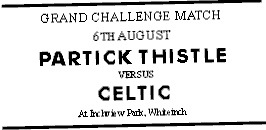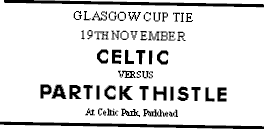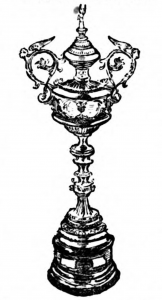1892-93 Cup success
-
Bad feeling after games against Celtic
-
First ever win over Celtic
-
Mid-table finish in the league
The reconstituted Alliance, consisting of Airdrieonians, Cambuslang, Cowlairs, Kilmarnock, Linthouse, Northern, Partick Thistle, Glasgow Thistle, and new members Vale of Leven. St Bernards were successful in their application to rejoin, the Alliance reducing their numbers from twelve to ten. With few exceptions all the previous rules were adopted, while a new rule that all visiting clubs’ guarantees were to be paid within ten days of the game.
A number of young players had been signed from the prominent local junior clubs Minerva and Jordanhill. Both clubs had recorded impressive seasons (Minerva won the Junior Cup) and Joe Leiper, Jacky Robertson and John Harvey had signed from Minerva. Docherty and James Ingram arrived from Jordanhill. Full back Hutchison signed from Vale of Leven but was immediately tempted to try professional football by signing for Bootle after just two games. Leiper, too, left after just a handful of games. He touted himself around English clubs, speaking to Sunderland before signing for Derby.
Andrew Smith of Partick Thistle was appointed President of the Scottish 2nd XI Association. A shower had been added to the bath at Inchview, though whether it was this that tempted the new members who had joined the club over the summer was unclear. The new members weren’t enough to dispel some concerns around the financial position of the club. A large prize draw was planned, reportedly with impressive prizes.
 The first game of the season saw an excellent crowd of 2,600 at Inchview for a game against Celtic, which had been advertised as being against the Celtic first XI. However, a weakened side was sent to Partick, still expected by Celtic to be good enough to win. Through goals from Ingram, Murray, Bruce and Paul, and fine performances from Leiper and Harvey, Thistle recorded their first ever win over Celtic, by 5-2.
The first game of the season saw an excellent crowd of 2,600 at Inchview for a game against Celtic, which had been advertised as being against the Celtic first XI. However, a weakened side was sent to Partick, still expected by Celtic to be good enough to win. Through goals from Ingram, Murray, Bruce and Paul, and fine performances from Leiper and Harvey, Thistle recorded their first ever win over Celtic, by 5-2.
After that encouraging performance, though, a 2-6 defeat from Third Lanark was followed by another 2-6 reverse in the first Alliance fixture, away at Kilmarnock and a 3-4 defeat at Inchview against St Bernards. Willie Paul again scored for Thistle. Thistle’s first Alliance win of the season came in mid-September away to Cambuslang (2-1).
Maryhill were the scheduled opponents in the first qualifying round of the Scottish Cup, and suggested they would pull out of the tournament if they received a payment. Whether that happened or not isn’t recorded, but they did scratch, leaving Thistle a bye into the next round, and a free Saturday. A friendly was hastily arranged against Royal Albert at Inchview – a 3-3 draw.
Eglinton Park was the venue for the first round of the Glasgow Cup against Wanderers, and Thistle were staring defeat in the face at half-time, 0-2 down. However, a scrimmage followed by Millar and Edgar provided the goals in the 3-2 win. The referee was criticised in the press as favouring Thistle – the third goal went over the bar, while numerous fouls were given against Wanderers’ players for nothing. No protest, though, was taken to the next Glasgow FA meeting.
A home tie against Johnstone, in the Scottish Cup, ended September. Thomas Donnelly, David Bruce and Robert Currie ended the Renfrewshire side’s interest in the competition in a 3-1 win at Inchview. Glasgow Thistle were the opponents next and they provided Thistle’s next Alliance defeat of the season, by six goals to 2.
The poor results continued into October with a defeat from Cowlairs at Springvale Park by 3-8, before Motherwell visited Inchview in the third preliminary round of the Scottish Cup. Motherwell took a 2-0 lead before goals from Willie Paul and John Harvey took the game to a replay. The following week Thistle arranged for one-shilling rail tickets to the game in the hope that a good support would travel. The supporters were rewarded when the team fought out a 3-3 draw. There being no provision for second replays, both teams progressed to the fourth round draw.
Scottish football faced considerable challenges in retaining players – tempting offers of professional football from clubs south of the border made it difficult to keep players. Renton reckoned there were so many of their ex players in England that three full teams could be made up of them. The SFA were slowly recognising this, and started to discuss the possibility of changing the rules to introduce professionalism into Scottish football. Support came from several League clubs who were already suspected on bending the rules to induce players to stay. Abercorn, Celtic, Rangers, St Mirren and Third Lanark were first to pledge. Renton, Dumbarton, Hearts and Clyde, and the Alliance clubs (including Thistle) were expected to join them.
Celtic were due to return to Inchview for the Glasgow Cup (although they tried to persuade Thistle to switch the game to Parkhead), and the committee had set up special training for the game – a prize was also to be awarded to the player who turned up most often for training. The Sporting Life described the game as being between “the team from the extreme east against the team from the extreme west”.
A stronger Celtic side than at the start of the season was selected, and Thistle took a 1-0 lead into half-time. Bruce left the field injured, and before he had time to return to the pitch, Celtic equalised, before scoring a second late in the game. At the next Glasgow FA meeting Thistle presented a protest, that Mulvey of Celtic had played a Lanarkshire Cup game for Carfin Shamrock, making him ineligible for the Glasgow Cup game. It appeared to be an honest, but clear, breach of the rules, and Celtic plead guilty immediately. The game as ordered to be replayed two weeks later.
However, an unexpected complaint was then raised by Celtic about Thistle “taking gate money in an unsatisfactory way” at the game. This referred to Thistle’s practice of allowing children into the ground for a penny, and not issuing a ticket for each transaction. Thistle commented that a Celtic committee man had been at the gate and had checked the number of boys entering and the moneys collected, and at the time was happy with the situation. Certain members of Partick Thistle were found guilty of irregularities but the club was absolved of guilt, and instructed to correct the mistakes. Celtic had wanted Thistle to be thrown out of the competition, while Thistle felt that Celtic’s protest was in direct retaliation for the original Mulvey protest, and that no Celtic protest would have been forthcoming had Celtic not been found guilty of playing the ineligible player. Such were the shady and opportunistic ways that protests were used. In a highly unusual request, Celtic demanded that they should be allowed to observe and double-check all gate monies at the replay but this request was not entertained.
Celtic were no doubt disappointed with the result of the protests but board member William McKillop shrugged it off. “Oh, it’s only the Partick Thistle. We have a reserve team.”
Scottish football remained, for the time being, an amateur sport. Celtic (certainly not the only Scottish club), were regularly suspected of compensating their players, although the under-the-table wages/expenses were never proved, or judiciously ‘ignored’. The Preston Herald reported an exchange between supporters that hinted at the hidden ‘professionalism’.
One enthusiastic Celt was constantly imploring Madden “To come away and show the blooming amateurs how it’s done.” Madden soon after scored, and a supporter of the Thistle sarcastically remarked “That was a £2 kick.”
Thistle withdrew Robert Campbell, and Celtic withdrew Cullen, who had both been selected for the Glasgow representative team who were facing Sheffield, to ensure strong sides for the replayed game, although Celtic did also play a handful of reserves. On entering Inchview the Celtic committee were unusually charged admission to the pavilion, an example of the uneasy relationship between the two clubs since the first game. A crowd of 4,000, the biggest ever at Inchview, saw Miller put Thistle into the lead after ten minutes. Thistle continued to have the better of the game, but Celtic equalised in the second half to take the game to a Celtic Park replay. Rumours circulated that Celtic considered Campbell of Partick Thistle to be ineligible, although a Celtic official replied that Thistle could have played eleven ineligible players, but Celtic would not protest, and instead take revenge in the replay. 
At Celtic Park the Partick Thistle committee found themselves barred from the pavilion, in a partisan home crowd which generated a gate £4 less than at Inchview and gave Thistle a cool welcome. Home advantage, and the better players (Celtic at last fielded their strongest team possible), told heavily – Thistle scored three own goals, and three were scored while Murray was off the pitch. Celtic finished the game as 8-0 winners and had their revenge.
While the Partick Thistle committee was undoubtedly disappointed with the Glasgow Cup exit, the gates from the three games had wiped out an £80 debt at Inchview. Not for the first time, or the last, that Thistle would gratefully accept the financial returns of playing Celtic.
Another group of Irishmen, Broxburn Shamrock, hosted the final preliminary game before the first round proper of the Scottish Cup. Thistle were the better team, but Broxburn seemed to have more determination. After losing early goals Thistle dominated and pulled the game back to 3-3, only to lose another late goal, a minute from time, to go out of the competition. A protest about the competency of the referee was briefly considered but decided against. Shamrock went on to reach the semi final before losing to eventual winners Queen’s Park.
Poor weather limited the football calendar for November and December, with just a few friendlies played – two 1-0 wins over Battlefield, and a 0-2 defeat from reigning Alliance champions Linthouse.
New Year saw Thistle in Belfast, and the Ulster Football News looked forward to the visit – “The Partick Thistle are a team which on several occasions have taught Belfast clubs a lesson in football”. A meagre attendance saw Thistle record a 5-3 win over Cliftonville, with goals from Paul, Stewart and Currie. A better crowd turned out for a game at Solitude against Zingari – a Belfast representative XI. Thistle again won, this time by 3-1 with goals from Paul and Stewart. The second goal was described thus – “… carried with a big rush, the Scottish forwards, the Irish goalkeeper, the leather, and every other movable article within reach going through.”. The Irish goalie mentioned was Tom Scott who joined Thistle for a short spell in 1898.
Thistle completed the first half of the season having won seven games, losing eight, and drawing three, scoring 37 and losing 58 goals. During the winter break full back William Hodge left the club to join Accrington Stanley.
A further friendly, a 0-2 defeat from Port Glasgow Athletic, was played before the second phase of Alliance fixtures got under way. Though halfway through the season, Thistle had played just five Alliance games, leaving them bottom of the table. P5 W1 D0 L4 F12 A 25 Pts 2. Home wins over Airdrieonians (6-3), Vale of Leven (3-1), Linthouse (5-2) and Kilmarnock (2-0) made up for a home defeat by Northern (1-2) and an away one at Vale of Leven (1-3), and took Thistle to 6th place in the Alliance.
Against Vale Willie Paul dislocated his shoulder, and was to miss the remainder of the season. John Gilchrist was to prove an able deputy.
At the monthly SFA meeting in January it was announced that Thomas Mackay of Partick Thistle had been suspended for a year for returning to Scotland after playing professional football in England with West Manchester, Burnley and Sunderland (although no Mackay is recorded as having played for the club).
Honorary secretary Andrew Smith, a devoted servant for eight years, announced his plans to resign at the end of the season. A committee were to organise a benefit match.
The good run of form stuttered in spring time, as a 2-2 draw with Airdrieonians was followed by a 0-7 defeat by St Bernards (the second such score against the Edinburgh club in two seasons), a 3-5 defeat by Cowlairs, and an 0-8 defeat at Port Glasgow. Thankfully, wins over Cambuslang and Glasgow Thistle kept the Alliance table looking respectable, though the last games of the season saw Linthouse triumph 3-2, and Northern beat Thistle 6-1.
Final league table.
| W | L | D | F | A | Pts | |
| Cowlairs | 14 | 2 | 2 | 68 | 31 | 30 |
| St Bernards | 11 | 6 | 1 | 60 | 40 | 23 |
| Linthouse | 11 | 6 | 1 | 52 | 46 | 23 |
| Airdrieonians | 10 | 6 | 2 | 62 | 48 | 22 |
| Glasgow Thistle | 9 | 8 | 1 | 49 | 44 | 19 |
| Partick Thistle | 7 | 10 | 1 | 44 | 61 | 15 |
| Northern | 6 | 10 | 2 | 46 | 57 | 14 |
| Vale of Leven | 5 | 11 | 2 | 33 | 53 | 12 |
| Kilmarnock | 3 | 10 | 5 | 41 | 51 | 11 |
| Cambuslang | 3 | 10 | 5 | 30 | 52 | 11 |

Greenock Charity Cup
Partick Thistle had always been popular invitees to the Greenock Charity Cup, having won the tournament several times in its inaugural period. This season they were paired with Dykebar in the first round, having little difficulty winning 6-0, before playing Morton in the final. Thistle had considered not playing in the competition this year, but must have been pleased to have changed their minds. Thistle won their first cup for eight years, beating the host team 7-4 at Cappielow.
At the club AGM in June Andrew Smith did indeed resign as secretary and was elected President of the club and presented with a purse of sovereigns in recognition of his past services. However, no volunteer could be found to take Smith’s previous secretary post. Smith resigned after less than an hour as President, and resumed his role as secretary of the club. Treasurer William Goudie brought the welcome news that games against Celtic, and a prize draw, had turned an £80 deficit to a £90 surplus.
Categories
- Miscellaneous (16)
- Other clubs (15)
- Players (26)
- Thistle – early years (48)
- Thistle – general (5)
Football history links
- Ayr United archive
- Bill Shankly
- Falkirk Historian
- Gallant Pioneers – Early history of Rangers
- Glasgow Herald archive at Google
- Hibernian
- Hibernian Historical Trust
- London Hearts
- Partick Thistle history archive by StuTheJag
- Rangers History
- Scottish Football Historical Archive
- Scottish Football Museum
- Scottish Sports History
- ScottishLeague.net and forum
